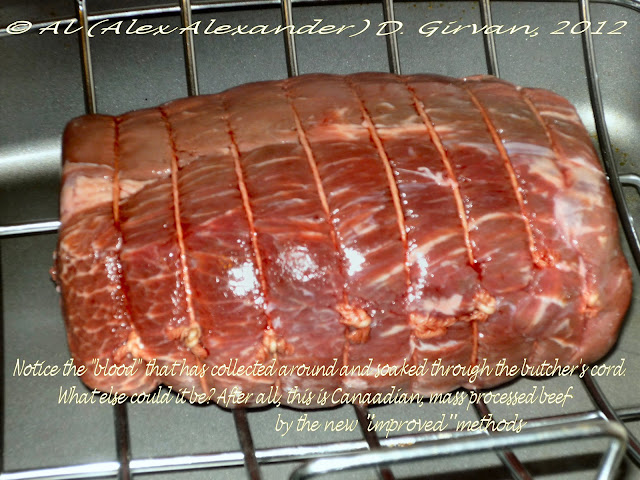Hey people, the problems with Canada's food safety are not new, existing long before 2009, free trade or the global market. Instead of the situation improving, we are regressing-going backwards. Economic growth-when and where there is such a thing that is not simply very dangerous inflation-does not; or, should not; mean reducing standards; nor should it be based on greed. Many of us, including myself, object strongly to government interference where it doesn't belong; but it's high time the government quits the political lying and starts to do at least a some small part of the job they were put in power for and are expected to do-which is not to go on a six month long, tax funded, holiday; every six months-but to look after the health,welfare, and well being of the State; the STATE being all Canadians.
Federal recall now affecting 210 beef products produced in Alberta
CBC
News
Posted: Sep 24, 2012 9:00 PM ET
Last Updated: Sep 24, 2012 8:55 PM ET
"The Canadian Food Inspection Agency has again expanded its recall of
made-in-Alberta beef, bringing 210 products under a newly widened health alert
issued over fears of E. coli contamination.
The federal recall affects meat produced at X-L Foods in Brooks. The
agency's latest update is the sixth such recall expansion on the range of
ground beef products since the original notice was issued eight days ago.
Over the weekend, the health alert was broadened to include medium
ground beef sold at Alberta Wal-Mart stores".
I'm sure you have read, or at least seen, this official 2012, news release before; but did you even see any of these others?
Meat recalls 2009:
 It would be very difficult indeed to "ROAST" the above meat cut; but, just possibly, if you were to exhibit enough perseverance and did not add any additional water; you might be able to, eventually, braise most of the"CRAP" out of it.
It would be very difficult indeed to "ROAST" the above meat cut; but, just possibly, if you were to exhibit enough perseverance and did not add any additional water; you might be able to, eventually, braise most of the"CRAP" out of it.
Typically, until now, hamburger has been the source of E coli contamination in Canada, but cases in which people are getting sick from steaks or roasting cuts should serve as your wakeup call.
Strictly the result of North American greed, E coli is now being, deliberately, injected or pushed into your meat products.
Pushing pathogens into meat makes it harder to kill the bacteria through cooking, harder to test for it on the meat packing floor and easier for the bacteria to multiply, by creating more perfect conditions; but it also allows the non caring, unscrupulousness, money hungry, marketers to scrape every cent of profit off the floor.
If you are planning on eating any type of mass market produced beef, fish, poultry, pork lamb, mutton, or veal, make sure it is cooked-at the very minimum-to well done-preferably charred to a cinder- and then –to be perfectly safe-instead of eating, throw it in the garbage. Canadian Meat products should not be taken internally-according to government policy-you do so at your own risk.
Strictly the result of North American greed, E coli is now being, deliberately, injected or pushed into your meat products.
Pushing pathogens into meat makes it harder to kill the bacteria through cooking, harder to test for it on the meat packing floor and easier for the bacteria to multiply, by creating more perfect conditions; but it also allows the non caring, unscrupulousness, money hungry, marketers to scrape every cent of profit off the floor.
If you are planning on eating any type of mass market produced beef, fish, poultry, pork lamb, mutton, or veal, make sure it is cooked-at the very minimum-to well done-preferably charred to a cinder- and then –to be perfectly safe-instead of eating, throw it in the garbage. Canadian Meat products should not be taken internally-according to government policy-you do so at your own risk.
Rick Holley, a food scientist and microbiologist at the University of Manitoba, found that through the process of "mechanical tenderization" 10 percent of bacteria and other contaminants from the surface was forced into the centre of the meat. One may think of this process as producing one piece hamburger. But pathogens on the surface of the meat doesn't only contaminate the meat-it is also spread to the needles or blades on a tenderizing machine. "It can be almost impossible to properly clean the machines, which can then spread E coli to other pieces of meat that are processed and tenderized.
Bottom line: no more medium rare, no more rare, and certainly no Steak Tartar or Steak American.
That’s basically the extent of concern shown and the advice given, in a Health Canada in a release entitled Information for Canadians on cooking mechanically tenderized/flavoured meat.
Bottom line: no more medium rare, no more rare, and certainly no Steak Tartar or Steak American.
That’s basically the extent of concern shown and the advice given, in a Health Canada in a release entitled Information for Canadians on cooking mechanically tenderized/flavoured meat.
Oct 28 2012, the latest instance of E. coli contamination in
Canadian produced meat products has sickened 16 people but, very luckily and thankfully,
there have, so far, been no linked deaths. Obviously, when
compared with say asbestos contamination, this chronic, long term, threat to
public health and safety is not the most lethal we have ever faced-at least not
yet-but give the governments, marketers, politicians and producers the same
time as was allowed for asbestos and tobacco and that can still change (these
people now want to legalize marijuana). So far the “official” response to tainted
meats and other foods has been that kind of stupid buffoonery “doesn’t worry,
be happy, we're making good money”. We have a federal Minister of Agriculture
and Agri-Business repeatedly expressing his concern for XL Foods, the cattle
industry, and the economy of Brooks Alberta. But he has been all but silent on
those who have been sickened an on the safety of consumers.
Our political leaders-federal and provincial can't seem to
associate, or visualize a connection between sickness, possibly even death caused
by contamination and rising cost of Health Care. They seem to believe that food
safety is solely the responsibility of individual Canadians, and it is very
troubling that they are using public agencies to deliver this wrong-headed-
possibly criminal- message.
A press release from Health Canada is a prime example. I
published my first article on this subject in 2009; yet this is the first acknowledgement-however
backhanded it is-that the SOURCE of the problem at XL Foods and other
facilities can be found in government action, policy or lack thereof.
XL Foods was using mechanical meat tenderizers (somewhat
similar to the machines used to produce commercial “Minute Steaks” but with longer
steel blades and needles). These machines not only pound the crap (fibre and
connective tissue) out of meat to make it tenderer but also inject water, pink
slime and other ”real crap” in. Alberta Health Services had previously “suggested”
that tenderization of steaks and roasting cuts at Costco stores in Alberta may
have factored in the E. coli illnesses. Management of the meat plant in Brooks
Alberta has since been taken over by JBS USA a subsidiary of a Brazilian
company. The company has not yet decided if it will exercise its option to buy
the plant.
Normally, pathogens such as E coli would remain on the meats
outer surface (one reason that Steak Tartar and so called Steak American were formerly quite safe to consume)and be killed by cooking, even if you like your
steak rare-as I do-partly because “over cooking” destroys many of the natural
nutritional benefits.Consumers should not have to cook their meat to death to kill E coli any more than they should be responsible for pasteurizing their own dairy products or boiling their tap water before drinking. Of course, it’s almost impossible to distinguish, just by
looking, which meat products have been tenderized or flavoured; because after
the meat has been treated the tiny holes seal up and disappear. However, Health
f Canada says the process of mechanically tenderising meat is a “very common
practice” “could be 50 percent of all meat produced and is used by suppliers,
retailers, and restaurants “to improve the tenderness flavour and nutrition of
cooked beef.
MORE RELATED TO THIS
STORY:
http://al-alex-alexander-d-girvan.blogspot.ca/2011/08/what-is-beef.html
When It Comes To Meat, And Other Food, Safety For Canadians, Why Does Ottawa And The Provincial Governments Let Us Fend For Ourselves?
Why do Canadians continue to allow these-so called- governments and the elected politicians there in, to to collect highly inflated salaries, in compensation carrying out and performing in a timely fashion; functions they are are not capable of or because of a conflict of career and/or financial interest, refuse to do?
When It Comes To Meat, And Other Food, Safety For Canadians, Why Does Ottawa And The Provincial Governments Let Us Fend For Ourselves?
Why do Canadians continue to allow these-so called- governments and the elected politicians there in, to to collect highly inflated salaries, in compensation carrying out and performing in a timely fashion; functions they are are not capable of or because of a conflict of career and/or financial interest, refuse to do?
©Al (Alex, Alexander) D. Girvan, 2012- All rights reserved




No comments:
Post a Comment